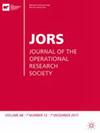在线专家服务平台的信息披露与定价
IF 2.7
4区 管理学
Q2 MANAGEMENT
引用次数: 0
摘要
摘要在线专家服务(OES)市场通过提供远程医疗咨询、法律咨询、财务规划等便捷的专业服务而蓬勃发展。然而,OES行业中信息不对称和幼稚消费者的存在这一现实现象,促使我们研究消费者的二维异质性和专家的代理定价策略对OES平台信息披露决策和相应的市场结果的影响。通过建立博弈论模型,我们考虑了一个垄断性的OES平台,在这个平台中,专家向大量的消费者提供服务,这些消费者可能是成熟的,也可能是幼稚的。因此,作为披露框架的设计者,该平台是卖家-消费者博弈中的一个额外参与者。我们的研究结果表明,当边际成本处于中间水平时,平台策略性地操纵消费者的估值信念,在不显著损失市场覆盖率的情况下增加盈利能力。此外,当天真的消费者存在时,与所有成熟的消费者相比,平台反直觉地披露了更多的信息。此外,有趣的是,当边际成本处于中低水平时,更多的天真消费者带来更多的信息披露,从而获得更多高端成熟消费者的需求,专家和平台都受益。关键词:网络专家服务平台信息披露机构定价博弈论注披露声明作者未发现潜在利益冲突。注1为了便于说明,我们将消费者称为“他”,专家称为“她”,OES平台称为“它”。“2 Statista。全球远程医疗市场规模2019-2030,请参见https://www.statista.com/statistics/671374/global-telemedicine-market-size/.3这一假设反映了目前OES行业中市场平台收取相当稳定的佣金率的现实。例如,www.chunyuyisheng.com声明,自2019年起,每次专家咨询结算时,将扣除平台服务费的20%。4为了便于说明,我们将1−2c和1−λ2分别称为λ0和c0。基金资助:国家自然科学基金(批准号:72071193、72293582、71971201、72188101、72271078);中央高校基本科研业务费专项资金(批准号:72071193);KY2040000049)。国家社科基金(No. 21&ZD129)和山东省泰山学者计划(No. 21&ZD129)资助;tsqn202103024)。作者也感谢山东大学齐鲁青年学者资助。彭雪峰感谢中国国家留学基金委的支持。本文章由计算机程序翻译,如有差异,请以英文原文为准。
Information disclosure and pricing in the online expert service platform
AbstractThe online expert service (OES) market is thriving by providing convenient professional services such as telemedicine consultation, legal advice, and financial planning. However, the practical phenomena, namely information asymmetry and the existence of naive consumers in the OES industry, motivate us to investigate how consumers’ two-dimensional heterogeneity and the expert’s agency pricing strategy with effort costs affect the OES platform’s information disclosure decision and corresponding market outcomes. By building a game-theoretic model, we consider the monopolistic OES platform in which the expert provides service to a mass of consumers, who can be either sophisticated or naive. The platform, as the designer of the disclosure framework, is thus an additional player in the seller-consumer game. Our results show that, when the marginal cost is intermediate, the platform strategically manipulates consumers’ valuation beliefs with partial disclosure to increase profitability without significant loss of market coverage. Furthermore, when naive consumers exist, the platform counter-intuitively discloses more information compared to that of all sophisticated consumers. Moreover, interestingly, when the marginal cost is low-to-intermediate, more naive consumers bring about more disclosure and thus obtain more demand for high-end sophisticated consumers, making both the expert and platform better off.Keywords: Online expert serviceplatforminformation disclosureagency pricinggame theory NotesDisclosure statementNo potential conflict of interest was reported by the authors.Notes1 For expositional ease, we will refer to a consumer as “he,” the expert as “she” and the OES platform as “it.”2 Statista. Telemedicine market size worldwide 2019-2030, please see https://www.statista.com/statistics/671374/global-telemedicine-market-size/.3 This assumption reflects the reality of fairly stable commission rates charged by the marketplace platforms in the OES industry today. For example, www.chunyuyisheng.com declares that a constant 20% of the platform service fee will be deducted when each expert consultation is settled since 2019.4 For ease of exposition, we refer to 1−2c and 1−λ2 as λ0 and c0, respectively.Additional informationFundingThis research was supported by the National Natural Science Foundation of China (Grant Nos. 72071193, 72293582, 71971201, 72188101, 72271078), the Fundamental Research Funds for the Central Universities (Grant No. KY2040000049). The research was also supported by National Social Science Fund of China (No. 21&ZD129) and Taishan Scholars Program of Shandong Province (No. tsqn202103024). The authors also thank the Qilu Young Scholars of Shandong University for financial support. Xuefeng Peng acknowledges the support from the China Scholarship Council.
求助全文
通过发布文献求助,成功后即可免费获取论文全文。
去求助
来源期刊

Journal of the Operational Research Society
管理科学-运筹学与管理科学
CiteScore
6.80
自引率
13.90%
发文量
144
审稿时长
7.3 months
期刊介绍:
JORS is an official journal of the Operational Research Society and publishes original research papers which cover the theory, practice, history or methodology of OR.
 求助内容:
求助内容: 应助结果提醒方式:
应助结果提醒方式:


